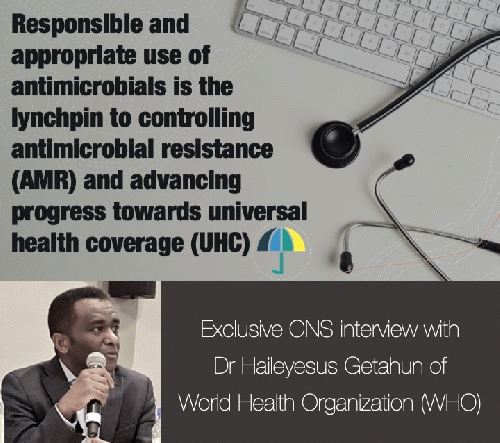SHOBHA SHUKLA - CNS
Universal Health Coverage (UHC) Day is 12 December

Stopping irresponsible and inappropriate use of medicines is a bedrock to advance universal health coverage
(Image by CNS) Details DMCA
Stopping antimicrobial resistance by promoting infection prevention, responsible and appropriate use of antimicrobial medicines in human health, livestock and food systems, is the bedrock for promoting universal health coverage. Failing this, the absence of efficacious antimicrobials will effectively return the world to the pre-antibiotic era before the 1920s when lives were lost at a far greater rate due to infection.
World leaders have committed to achieve #HealthForAll and deliver on the promise of universal health coverage (UHC) by 2030 - one of the key targets under Sustainable Development Goal-3. This implies significant increases in access to quality healthcare. Ensuring equitable access to affordable and effective medicines to treat diseases is a fundamental part of this vision. However, antimicrobial resistance (AMR) makes common infections no longer treatable by drugs and poses a serious challenge to achieving this goal.
Dr Tedros Adhanom Ghebreyesus, Director General of the World Health Organization (WHO) has rightly said recently that, left unchecked, antimicrobial resistance (AMR) will rollback a century of medical progress, damage the environment, interrupt food production, cause more people to fall into extreme poverty and imperil global health security. Tackling AMR must therefore be seen in the broader context of efforts to strengthen health systems and achieve UHC.
What is Antimicrobial resistance (AMR)?
Simply put, antimicrobial resistance occurs when bacteria, viruses, fungi, and parasites (microbes) change over time and no longer respond to medicines making infections harder to treat and increasing the risk of disease spread, severe illness and death.
While AMR occurs naturally over time, usually through genetic changes, many humanmade factors have accelerated its spread through misuse or overuse of antimicrobials in humans, livestock and agriculture, poor infection control in healthcare facilities and communities, and poor access to quality, affordable medicines.
(Note: You can view every article as one long page if you sign up as an Advocate Member, or higher).





